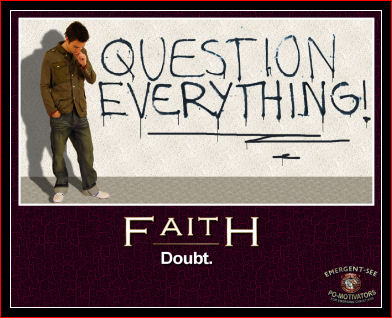by Frank Turk
Yesterday I posted
part 1 of 3 regarding the organization "Abolish Human Abortion," a group of fellows who are very proud of what they have set out to do -- which is the right-minded objective of abolishing human abortion. Yesterday I made one statement that ought not to be ignored, so I'll repeat it here.
Let me make sure I say this as clearly as possible:
All murder is wrong
That's the moral premise which under-girds any work to limit or abolish abortion. Anyone commenting or responding after this series of posts goes live who ignores this essential fact of Christian ethics in my position is selling something unsavory.
Yesterday we covered the interesting idea that these fellows are the only ones doing anything not-evil in the fight against abortion. Today we are going to cover some of their theological reasoning.
The five major tenets of this organization are as follows:
1. Biblical
Usually, when an organization says it is "Biblical," it means that it reasons biblically to its objectives and to its means. The tenet of "biblicism" is therefore usually a foundational objective -- not a list of Bible verses. It usually outlines the method or approach the group takes toward the Bible -- it establishes a hermeneutical standard, or a tradition in which it stands. The list of Bible verses usually comes later.
In this case, they present the Bible verses right here, and the list is simple:
Micah 6:8
Isaiah 1:16-17
Eph 5:11
James 1:27
Luke 4:18-19
That is: the tenet here is not that they will use the Bible as a sufficient and infallible authority. If they did, maybe they would have a local church which was overseeing them to make sure they weren't doing things they ought not to be doing, for example. The tenet, rather, is a list of Bible truths which they demand to be taken at face value without further comment:
- do justice, love mercy, and walk humbly with our God
- make the church holy, reprove the ruthless, and defend widows and orphans
- expose all evil
- be holy and "visit" widows and orphans in need
- Keep the two great commandments
- Human beings are in the image of God
- Jesus became a man to save men from "sin, self-destruction, death, and eternal separation from God."

This is interesting because at first glance, the list is actually a random list of true statements from Scripture. All of the statements are true. The question we have to ask is why these in particular have any priority over any other statements of truth -- for example, the commission of the church to make disciples of all men (Mat 28); the demand of Christ to love one another (John 13); requirement of Husbands to love their Wives (Eph 5); the demand that there be no divisions in the local church (1 Cor 1-3). And just to keep things testimentally balanced, how about the idea that God hates divorce (Malachi 2); or that God hates all evildoers (Ps 5:5); or that God hates the double-minded and liars (Ps 119); or that God hates Robbery (Is 61)?
Superficially, there is no question: they have seven true statements from Scripture. Whether these statements are necessarily the most important statements of Scripture regarding the existence of the church or the purpose of men (with or without faith) is simply undemonstrated. What's the cause from the text or from good reasoning which causes these verses to be so true that they cause us to create a new #1 priority for the church?
In that: I think the idea that these fellows are "Biblical" remains to be seen. They have Bibles; they can extract true statements from the Bible. Whether they use the Bible for its necessary purpose, to say what it means to say, remains to be seen.
2. Providential
The next part is worth transcripting fully:
We rely on the Providence of God, not the pragmatism of man. Abolitionists do not trust in warhorses or chariots. We trust in the spiritual means and methods God has given to us in His Word. Abolitionists have always cried, “duty is ours, the results are God’s!” We look to the Spirit of God to lead us, believing He is our ever present guide and that He is not silent.
We depend upon the Providence and Sovereignty of God. “… He giveth to all life, and breath, and all things.” (Acts 17:25) It is the power of God working through His Holy Spirit that changes hearts. Yet we acknowledge that God has deemed men active participants in this drama. He gives us choices, and these choices have consequences. (Matt. 9:38, Acts 27:22,31) We are called to be faithful – to walk in righteousness – to speak the truth in love. We leave the results in His hands.
These fellows escape being true hypercalvinists or fatalists by admitting they are, at least, called to do something -- and good on them for that. They say they have a moral obligation to participate in the drama -- which is a fascinating turn of phrase. But it's funny that they demand that they do not trust in chariots and warhorses -- because they do rely on graphic posters and sandwich boards. (see some examples
here, but click at your own risk as they are explicit regarding the cost of abortion in human terms) That is: they do rely on shock and awe to deliver a message. And at the end of it, they do want the laws to change -- they want the horses and chariots of the Government to protect unborn lives, yes?
Moreover, they also are not merely content protesting abortion at local clinics: they have
an explicit mission to "exhort" local churches (again:explicit warning) who do not meet AHA's definition of being sufficiently-militant towards abortion. It seems, at least, odd that they are worried about relying on means when, frankly, they have such explicit means and militant means -- and demand the same from others.
Let's be clear about the reasoning here: they can't accept an incremental change in the law of a local state or a nation because that's complicity with evil, but they can
protest exhort one church at a time to change that church's ministry objectives (changing one church, not all churches) to suit the objectives of AHA. And they don't trust in horses and chariots, but they do demand these churches change their behavior right now.
We'll have to wait for tomorrow for the comments to be open to see what sort of response AHA can muster toward the charge that while they are not politically incremental, they are unquestionably spiritually incremental -- even if it is because they have limited resources.
3. Gospel-Centered
You know: someplace in this neighborhood of the internet, the phrase was coined, "The Gospel is the Solution to Culture." I have made the T-Shirts. It's my attempt to doff my hat the best-in-class in post-millennial theology to see the Gospel not as some weak tea which causes us to lose a lot of battles so that Christ can just win in the end, but rather as our vision of what's the right priority in this world. It's the way Paul saw the world -- that all
suffering is worth enduring if we can only tell people the truth about themselves and about God. We would to God that all who hear us at any time might become such as we am—except for the chains, as the Apostle so blythely said. (Act 26)
And to their credit: the AHA team says this:
We are committed to an uncompromising adherence to the good news that God stepped down into human history as Jesus Christ. He was conceived in the womb of a young unmarried woman who did not choose to be with child. He lived a sinless life, and by His death redeemed a lost, wandering and wicked people from sin, punishment and eternal separation from God.
But then they spoil it by saying this:
The fullness of the Gospel of God is supreme above all philosophies and ideologies and without the Gospel there would be no call or means of Abolition.
Well, no. First off, the Gospel is not an "ideology." It's a declaration of fact. It's not a system of political thought, or a religious scheme. It's a declaration that God has done something which spares sinful man from judgment. The Gospel is a message, a word of Good News. You'd think biblical fellows would know this, but like all people overwhelmed by an agenda of social justice, they have simply forgotten it.
But second, the reason that we abhor murder is not that Christ was murdered: the reason we abhor murder is that the Law teaches us that Murder is wrong. In fact, the idea that murder is wrong is so obvious, Paul tells the Romans that such a thing is written into the very fabric of the universe and the very conscience of man (purists: Rom 1-2). The call to "abolition" comes from the fact that murder is wrong -- not from that fact that sovereign God has made a way to forgive men for sin.
And this, frankly, also goes back to whether or not these fellows are actually "Biblical." They are unable to distinguish the Glory of God in Creation from the Glory of God in Christ -- they cannot, in fact, distinguish between revelation in creation and the special revelation in Scripture which Christ fulfills.
That's troubling. And it's not the only place these guys could do with a second or third reading of the whole Bible for the sake of actually being a little more Biblical.
4. Body Driven
and
5. Immediate and Uncompromising
We should let them, again, speak for themselves:
We believe that Abolition is an Obligation of the Church. We seek to awaken the Church to fulfill her ordained purpose to be salt and light in this sin spoiled and darkened world. The primary means God has ordained to display his manifold wisdom to the world is through his people, his body and bride. The church must take the gospel to the ends of the earth and bring it into conflict with every dark deed of man.
Read that again, especially the emphasized part (I added the emphasis). Abolition is not the spread of the Gospel: Abolition, by their own definition, is the end of abortion first and with gusto. While they say their primary means for this is the Gospel (to which they do injustice when they explain it), think about this: they have equated Gospel proclamation with the uncompromising end of one particular form of sinfulness. In that, they have re-defined the mission of the church not to see to it that we are ambassadors of Christ, pleading from God a message of reconciliation: they have made the church's necessary obligation the improvement of society for one particular moral end.
Look: I have no problem saying that, because a church is located in a place where there are lost people, they
SHOULD minister to those lost people and not to lost people in theory or in general. A church next door to a strip club ought not to cut a deal with its neighbor that it will not preach the Gospel in front of their business because their business will be harmed. A church next door to a casino shouldn't turn the other cheek when that parking lot has more people in it than the church lot does on a Sunday morning. And to be as clear as possible, a church in a neighborhood with an abortion clinic ought to be involved in making sure that this place with those sinners receive the word of God so that they will repent.
But here these fellows have made a statement that places "abolition" on-par with Baptism. They have put it on-par with the Lord's table. They have put it on-par with weekly worship -- and they do it for all churches. That's what Capital-"C" "Church" means there. All Churches, right now, should drop what they are doing and Abolish Abortion.
For a group claiming to be, first and foremost, Biblical, I think they have a lot more Bible to cover before they do anything else. And while that shortcoming is evident here, I think it is far more obvious in what we'll cover in the last installment, tomorrow.
Comments are closed until tomorrow.































 e're often told by gurus of church-growth and guardians of postmodern values in the evangelical community that we mustn't erect "boundaries."
e're often told by gurus of church-growth and guardians of postmodern values in the evangelical community that we mustn't erect "boundaries."










